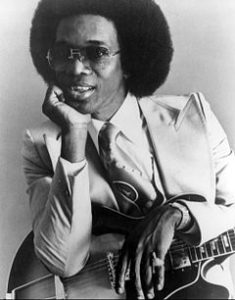We lost one of the greats when Yvonne Staples of the Staple Singers died this week. Rest in peace.
Funk. The term means different things to different people. James Brown was funky. So is Parliament Funkadelic. Last week I told you about Chuck Brown. He was funky. But Miles Davis was also funky, and so is Chaka Khan. So what is funk? Well, I suppose the answer is that it’s in the ears of the listener. The bottom line is that if you hear a song and it gets you moving, it’s probably funky.
Johnny ‘Guitar’ Watson knew a little something about funk. He was born in Houston and his early guitar heroes included T-Bone Walker and ‘Gatemouth’ Brown. His grandfather, a preacher, gave Watson his first guitar on the condition that he wouldn’t use it to play the “devil’s music.” Watson agreed but didn’t live up to his end of the deal. He was still a child when he played with such Texas guitar notables as Albert Collins and Johnny Copeland.
Watson’s parents separated in 1950 Watson and he and his mother moved to Los Angeles. He was 15 years-old at that time. Once there, he began playing and winning local talent shows. He played jump blues with Chuck Higgins and Amos Milburn, and made his first recording, as Young John Watson, for Federal Records in 1952. He adopted a new middle name after seeing the film Johnny Guitar in 1954.
Known for his outrageous showmanship, Watson was an innovator on guitar. His 1954 single “Space Guitar” was an early demonstration of the use of reverb and feedback on a record. Three years later, he released “Gangster of Love” on Keen Records. The single became a big hit … 21 years later. Meanwhile, Watson was touring with artists like Larry Williams, Little Richard, Don and Dewey, The Olympics, Johnny Otis, Sam Cooke, Herb Alpert, and George Duke. He even played on two tracks on the 1975 Frank Zappa album One Size Fits All.

Watson knew that he had to change with the times so when the popularity of the blues began to wane and soul music began to rise he transformed himself from a blues singer into a soul singer, complete with flashy clothes, big sunglasses, and lots of bling. His music also changed, moving from blues to funk. Watson scored with records like “I’m Not Your Man,” “I Need It,” and “A Real Mother For Ya,” all prime examples of ’70s funk. And while they didn’t do much on the pop chart, they all scored on the R&B charts. One of Watson’s biggest hits of the era was “Superman Lover” which was released on DJM Records in 1976. The record reached #19 on the R&B chart that year and very nearly crept into the Top 100 on the pop chart.
As the 1980s dawned, Watson was in trouble. His friend Larry Williams had been shot to death and Watson himself was mixed up with the wrong people. His problems took him out of the spotlight for awhile but he made a powerful comeback in 1994 with his album Bow Wow. The album was a chart success and also brought Watson a Grammy nomination.
In 1980, Watson had a hit single called “Telephone Bill” on which he rapped. When asked about that record years later, he staked a claim as a pioneer of the genre in an interview with David Ritz.
“I damn well invented it! And I wasn’t the only one. Talking rhyming lyrics to a groove is something you’d hear in the clubs everywhere from Macon to Memphis. Man, talking has always been the name of the game. When I sing, I’m talking in melody. When I play, I’m talking with my guitar. I may be talking trash, baby, but I’m talking.”
Watson’s music has been sampled repeatedly by hip-hop artists including Red Man, Ice Cube, Easy-E, Snoop Dogg, Dr. Dre, Jay-Z, and Mary J. Blige. His influence as a guitar player is also widespread. Steve Miller covered Watson’s “Gangster of Love” in 1968, and guitar players like Frank Zappa, Stevie Ray and Jimmie Vaughan, and Bobby Womack testified to the power of Watson’s influence. And it wasn’t just guitar players and rappers who were influenced by Watson. Singers like Etta James also expressed admiration.
“I got everything from Johnny,” James said. “He was my main model. My whole ballad style comes from my imitating Johnny’s style. He was the baddest and the best. Johnny ‘Guitar’ Watson was not just a guitarist: the man was a master musician. They call Elvis the King, but the sure-enough King was Johnny ‘Guitar’ Watson.”
In 1995, Johnny ‘Guitar’ Watson was honored with a Pioneer Award from the Rhythm & Blues Foundation. A year later, he died of a heart attack while on tour in Japan.





Comments